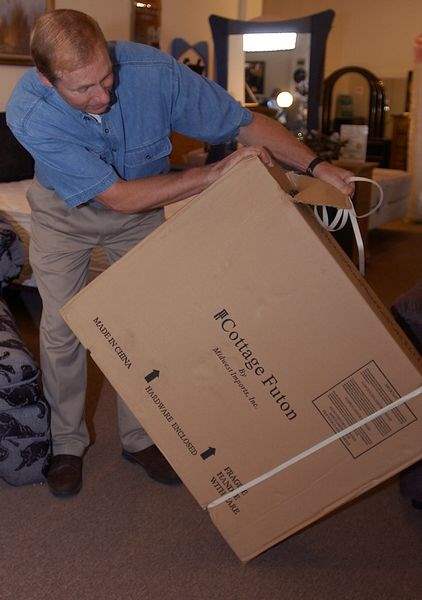
Skirmish in the bedroom
7/20/2003
Mike Shea, of Toledo's Shea's Furniture and Sleep Shop chain, says Chinese imports are bargains for customers.
lisa dutton / blade

Mike Shea, of Toledo's Shea's Furniture and Sleep Shop chain, says Chinese imports are bargains for customers.
U.S. furniture manufacturers face a bedroom coup.
And now, in a counteroffensive being closely followed in northwest Ohio and southeast Michigan, domestic producers vow to bring an end to what they describe as illegal dumping of beds, dressers, and other bedroom furniture by Chinese manufacturers.
Monroe-based La-Z-Boy Inc., which is the nation's second-largest furniture manufacturer, and Archbold-based Sauder Woodworking Co., which is number six, haven't yet signed on to the campaign to seek new duties on bedroom suites imported from China.
“We are closely monitoring the situation and will evaluate it as things move forward,” said Mark Stegeman, spokesman for La-Z-Boy, whose output of furniture under various brand names is exceeded only by Furniture Brands International Inc., of St. Louis.
Sauder Chief Executive Kevin Sauder is taking a similar position, although that firm's situation is slightly different because the ready-to-assemble furniture it produces has been less affected by imports.
Backers of the campaign for new duties, which was announced last week, contend that if nothing is done furniture manufacturing will follow textiles, electronics, and other industries offshore.
“Our industry has suffered devastating losses,” said campaign spokesman Doug Bassett, a vice president at Vaughan-Bassett Furniture Co. in Galax, Va.
“The future of the domestic furniture industry is at stake,” Paul Broyhill, another campaign spokesman and longtime furniture executive, said in a more ominous pronouncement.
In the industry's manufacturing heart in North Carolina, more than 40 furniture factories have closed in the last 21/2 years.
Pending casualties include a plant in Monroe, N.C., and two plants in Morristown, Tenn., operated by La-Z-Boy's Pennsylvania House and Lea Industries units.
The closings, scheduled for next month, will affect 480 workers, the company said.
The number of U.S. workers making bedroom outfits, dining room suites, and other wood furniture fell by 3,500, or 27 percent, the last three years to an estimated 95,000 in May, according to the Labor Department.
Production of wood furniture by U.S. manufacturers dropped to $10.7 billion last year from $12.1 billion in 2000, the American Furniture Manufacturers Association said.
That was caused in part by skyrocketing imports from Asia, primarily China.
The Chinese shipped $2.9 billion in wood furniture to the United States, which was more than triple the level of 1999, the U.S. Commerce Department reported.
Through March, imports from China were 44 percent ahead of the prior year.
The development is occurring just as U.S. manufacturers are facing pressure from other quarters, including soaring costs of providing health benefits to employees.
At a congressional hearing last month, a furniture executive testified that health insurance expenses doubled in the last five years and that his company spent more on health care in 2002 than it did on lumber, fabric, and leather to make furniture.
Still, the growth in imports has been a boon for furniture buyers.
The imports have always had a price advantage. And now, quality has risen to a point where buyers no longer worry about a chair rung falling off or a bed collapsing, according to retailers.
“The consumers have won,” said George Evanoff, general manager of Toledo's Banner Mattress and Furniture Co.
Budget-conscious customers who once would have had to settle for a bedroom outfit made of pressed board wrapped with wood-look laminate can now buy furniture made with wood veneer for the same price, he said.

A suite of bedroom furniture is among the imports from China at the Shea's store on Lagrange Street in Toledo.
Imports from China are not new, but manufacturers there have expanded offerings from higher-end items to less expensive furniture aimed at a mass market, Mr. Evanoff said.
At Shea's Sleep Shop, which operates four stores in the Toledo area, imports have become commonplace on the sales floor.
So have bargains. “Ten years ago what retailed for $1,500 is $1,000 today,” said the firm's Mike Shea. “There is huge deflation in the furniture industry.”
He said he doubts that customers know or care that many selections are from China and other Asian countries.
Still, he sometimes frets about the impact on the nation's manufacturing base. “It's a little scary all in all,” Mr. Shea said.
But manufacturers, led by a group calling itself the American Furniture Manufacturers Committee for Legal Trade, argue that the Chinese aren't playing fair.
They cite $2-a-day wages, reduced workplace safety standards, fewer environmental laws, and efforts by China's central bank to keep the value of nation's currency - and thus the price of manufactured goods - low.
Not only is this unfair, it is also illegal, argues the campaign's Mr. Bassett.
“If you take a $1,000 TV stolen from a store and resell it on the black market for $200, that TV would be cheaper for consumers. But that TV would be illegal. We are arguing that China's bedroom shipments are similarly illegal.”
Campaign backers plan to file an anti-dumping petition in October with the Commerce Department and the U.S. International Trade Commission.
They say that China's entry into the World Trade Organization in 2001 makes it easier to prove their case. Because China is classified as a member nation without a market economy, the domestic manufacturers won't have to assemble difficult-to-gather data about China's manufacturing costs.
Rather, they will identify manufacturing costs for an identical item in a similar economy such as that of India or the Philippines. If that amount is higher than the price charged by Chinese manufacturers, the United States is entitled to impose a tariff equal to 50 percent of the difference, campaign spokesmen said.
Domestic producers, who note that such tariffs have already been slapped on 44 other categories of goods imported from China, say they will seek protection for other types of wood furniture if the first petition is successful
But “The case is not going to be as easy to prove as the manufacturers think,” said Barry Vogel, a furniture analyst with du Pasquier & Co. Inc. in New York. “You're not going to be able to stop lower-priced quality products coming into this country. It's good for the consumers. Period.”
So far, the two biggest domestic manufacturers, Furniture Brands, with $2.4 billion in annual sales, and La-Z-Boy, with $2.1 billion, haven't joined the campaign.
Foreign imports and a sluggish economy have forced La-Z-Boy to close factories and cut 1,000 of its nearly 18,000 employees the past three years.
Sales of wood furniture accounted for a quarter of sales last year, down from 30 percent two years earlier.
The company's spokesman noted that many of the 19 manufacturers who have announced they will support the petition are more heavily reliant on wood furniture than La-Z-Boy is.
Another reason for the firm's reluctance to join the campaign is that La-Z-Boy has become a major importer.
Forecasts are that 40 percent of wood furniture sold in the current fiscal year will be imported, up from 21 percent just two years ago.
As part of a restructuring of wood furniture production announced last month, La-Z-Boy has established a 10-person group in Greensboro, N.C., to oversee purchasing from foreign manufacturers for all brands.
With the surge in imports, transportation expenses are on the rise. The cost of moving a shipping container - which is about the size of a large semi-trailer - of furniture from Hong Kong to the East Coast has increased to $3,700 from $2,900 last year.
The region's other major furniture manufacturer, Sauder, has begun to see competition from foreign manufacturers.
But so far, overseas competitors have been unable to inexpensively duplicate the stylish ready-to-assemble furniture that is the firm's specialty, said the chief executive.
Sauder, which has about 3,600 employees in Fulton County, believes that its highly automated manufacturing process and knowledge of laminating will continue to give it an advantage over overseas producers.
“We will rely on a combination of uniqueness, speed, and automation,” Mr. Sauder added.
Even so, the firm continues to monitor the situation. Sauder recently completed the purchase of Los Angeles-based Studio RTA, which not only makes ready-to-assemble furniture but also has experience in importing.